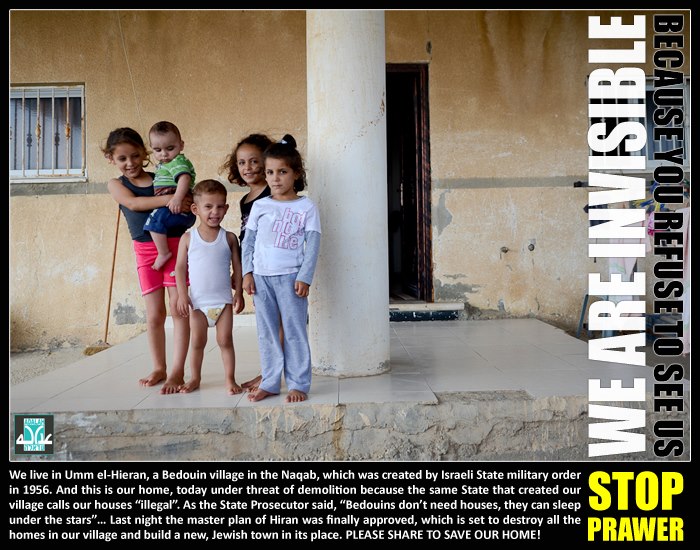Children's allowances must not be cut based on new law

Photo from Adalah's Stop Prawer campaign to fight forced displacement
Adalah Attorney Sawsan Zaher: "The law will harm thousands of Arab Bedouin children who are not vaccinated because of lack of medical services."
Motion for injunction to stop the implementation of the law
On 3 April 2013, Adalah filed a motion for injunction to the Israeli Supreme Court to prevent the enforcement of an amendment to National Insurance Law enacted in 2010 which will cut up to 60% of state-funded allowances for children born after 2012 if they do not receive vaccinations mandated by the Ministry of Health. Many children in the unrecognized Arab-Bedouin villages of the Naqab (Negev) are not vaccinated on schedule due to the lack of access to state health services for their families.
In a warning letter to children's parents, the Ministry stated that it will begin enforcing the law against families of children without immunizations in June 2013. The announcement comes despite the existence of a conditional order given by the Supreme Court on the issue and ongoing legal proceedings.
Ongoing case challenging the constitutionality of the law
Adalah Attorney Sawsan Zaher filed a petition (HCJ 7245/10) challenging the constitutionality of the law in October 2010 on behalf of ten Arab-Bedouin women, citizens of Israel, the chairmen of local committees of three unrecognized villages, Yasmin al-Naqab (an Arab Bedouin women’s rights NGO), Ma’an - The Forum of Arab Bedouin Women’s Organizations in the Naqab, and the Hadanat El-Nasra Association.
The petition harshly criticized the new law for further punishing children already living in poverty, and the Ministry for making vaccinations so difficult to obtain. "The Ministry of Health does not address the acute shortage of clinics and health services in the unrecognized villages of the Naqab," the petitioners argue.
Lack of access to state health clinics; poorest children suffer
Adalah as well as other human rights organizations have filed numerous petitions to the Supreme Court on behalf of Arab-Bedouin families for the opening of more mother and child clinics. The Ministry of Health continuously refuses to open a sufficient number of clinics, despite clear recommendations from the competent authorities. Now, by cutting insurance allowances from children who are not vaccinated, the Ministry doubly endangers the country's poorest and most vulnerable children.
The petition clarified that the petitioners are well-aware of the importance and benefits of vaccinations for children, while full compliance depends on the opening of more clinics.
However conditioning child allowances on vaccinations now will only increase the number of children living far below the poverty line, as those from the poorest families are the least able to reach distant clinics for vaccinations.
Read more: Arab Bedouin in the Naqab (Negev), children, health
Citation: HCJ 7245/10, Adalah v. Minister of Welfare and Social Affairs (case pending)














